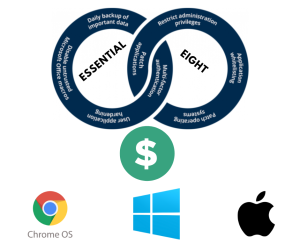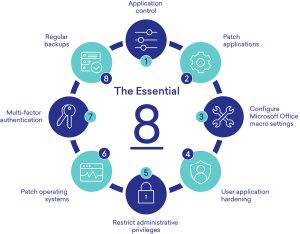It is best standard practice to backup your data. Businesses are increasingly sending critical data to cloud-based services or applications (known as software-as-a-service (SaaS)) such as an online email exchange service or accounting application providers.
According to a recent research paper by global research and advisory firm Forrester Research Inc, it is projected that by 2015, companies will be using up to 66 providers each. Whilst there has been a continual growth of the use of SaaS, alarmingly most businesses do not have a proper plan for data retrieval and data recovery. It is important to understand that many SaaS providers will not restore lost data for their users and if and when they do they charge a premium. So, it is critical for businesses to ensure that a proper plan is set in place to mitigate the risk of losing cloud data. The simplest way to do this is to back up the data using cloud-based services.

Why are data backup cloud-based services important for businesses in 2022?
Updated: February 2022
The benefits of cloud-based services
1. Security
One of the biggest concerns that many businesses have when it comes to cloud-based services is security. If you don’t have your precious files and sensitive data onsite, how sure are you that your cloud service provider is protecting it? If you can access your files remotely, why can’t the hackers? These are valid concerns and you should know that a cloud service provider’s main concern is to carefully monitor the security around your files and data.
It’s a lot more secure than keeping it in-house. How? Cloud service providers are specialists and well updated when it comes to cybersecurity trends. They allow you to focus on what you do best while they ensure that your files are safe and ready when you need them.
Google’s regular updates, for example, on their DLP or Data Loss Prevention protocols and Drive labels show your how they take security as a priority.
2. Cost savings
Another concern that businesses have is the cost. With cloud-based services, it has been proven that you’ll be able to save on costs in the long run. While weighing the advantages and disadvantages, there are a lot more factors to consider than just the initial cost – one of the more significant ones is the ROI.
At the same time, most cloud-computing services are pay as you go. This means that if you’re not going to take advantage of the full capabilities of the cloud, you don’t have to keep spending on it.
3. Flexibility and Mobility
Cloud-based services offer flexibility by allowing you to redistribute your manpower, especially your IT team, to more important matters such as reaching your business goals, improving services, and satisfying customers on the backend of transactions. In other words, your IT department won’t have to spend time paying attention to data-storage issues. This is the case when your cloud services provider will be taking care of that for you.
In terms of mobility, most cloud-based services such as Google Workspace are now available on different devices. Access your files, work uninterrupted, work on the go with the right cloud-based solution.
4. Insight
Cloud-based services such as Google Workspace have an integrated smart AI. This provides you with a different perspective when it comes to looking at your data. Features like this will make sure that you’re above the curve when it comes to the trends of your data. Information that AI integration provides can help improve the overall efficiency and planning of the company.
5. Collaboration
For businesses with two or more employees, cloud computing services are going to be really helpful. Cloud-based services make collaboration a lot easier. Platforms such as Google Drive, for example, allow for real-time coediting of documents.
6. Quality Control
With cloud-based services, employees can access the same files in one place. Due to this, there will be a consistency in data, human error is easily avoidable, and there’s a clear record of the changes done by each member.
7. Loss Prevention and Disaster Recovery
Investing in cloud-based services mean that you won’t be relying on your onsite computers and servers to handle your sensitive company data. You’re making sure that whatever happens to your devices, you can still access your data due to the cloud. There’s no fear of losing data due to office incidents since your data is stored safely and separately.
In an event, however, where your devices are all wiped and you have to start from scratch, you won’t entirely be starting from nowhere. Since you can recover your data from the cloud, you can make sure that your business will continue to run smoothly despite uncontrollable incidents.
8. Automatic Software Updates
One way to stay ahead of the malicious users is by regularly updating your cybersecurity protocols. This is another feature that cloud-based services can assure you. Should you choose not to invest in cloud-based data solutions, you would have to dedicate a few personnel from your IT department to take care of your data which is an expense you can definitely avoid.
9. Competitive Edge
Data security, AI integration, regular software updates – these features ensure that your data security and backup is at the top of the line. You can rest easy knowing that your business is safe from numerous potential threats and complications. Cloud computing is the future of data storage and analysis – stay ahead of the curve by integrating it into your business now.
10. Sustainability
Hosting your data on the cloud is more environmentally friendly as opposed to running your own data servers on site. It results in fewer carbon footprints and they address wastefulness at every level of the business since data is everywhere.
The most common ways business loses data in the cloud
- Migration errors where data is lost during the migration process either by sync inaccuracies, human error or overwriting of data.
- Accidental deletion particularly when the problem is left undetected and the data “ages out” of the trash can. It can also be caused by accidentally overwriting the correct copy with incorrect information. Many cloud platforms cannot fix this problem easily.
- Malicious insiders such as disgruntled employees or contractors consciously and maliciously destroy data. The degree of damage will depend on the authorisation and access granted to the user.
- Rogue applications in the form of add-on applications that corrupt, delete or duplicate existing data. This is a real threat considering for example salesforce.com’s AppExchange now boasts almost 2,000 apps and 1.9 million installs.
- Departing employees and closing down of accounts often mean closing down of access to associated data. It is important that there is a backup of the data prior to deactivation.
What is the cost of not backing up your data for your business?
Many SaaS providers will not recover data for customers and when they do it is a very costly exercise. For example, Salesforce.com will charge a minimum of $10,000 to recover customer data. Even then, it will usually take several weeks.
Always ask your SaaS providers about their data recovery policies. If they do not have an inbuilt data recovery service then you should engage a third-party backup provider to manage this for you. During the past few years, a new class of backup software providers has emerged known as cloud-to-cloud data backup providers. A highly recommended cloud-to-cloud backup provider which we use for our clients is Spanning Backup. As most of our customers are using Google Apps, Spanning works hand in hand to ensure all the users’ data is backed up. This includes the backup of whole user profiles, emails sent/received, email folders, contacts, calendar appointments and all the data in Google Drive. Spanning is versatile as it allows users to easily restore the data themselves or for designated administrators to do this for them.
As a Spanning and Google Apps partner, Onsite Helper ensures the systems are set up correctly and educate the relevant people on data restoration processes. The cost of the Spanning service is $40 per user per year for businesses that are highly affordable. Spanning also offers backup of Salesforce.com. This is fantastic considering that businesses without backups can be subject to at least a $10,000 fee and weeks of stress when data is lost.
It is also recommended that businesses create a DRP (Disaster Recovery Plan) and simulate the disaster to test it works.
What should the Disaster Recovery Plan include?
- A list of places where important business data is being stored in the Cloud such as Google Apps or Salesforce.
- The process of how to restore the data including time frames for the recovery.
- All the login credentials for the providers and support contact details if the issue needs to be escalated.
- How often the DRP is tested/simulated for example once per year, once per quarter.
- Where the DRP document is located. I personally have a hard copy which is stored in the server/IT room of my client’s business.
Interested in Google Workspace?
Want Google's Cloud-based Services? Let us help!
Onsite Helper is the leading Google partner in Australia. We are here to help you with anything Google Workspace – from migration to creating a fully Google-integrated working atmosphere.
Right now in the post-pandemic era, most businesses have embraced remote working setup. Are you also thinking of building a perfect home-based or remote team for your business? Reach out to us today by filling out the form below. Let’s talk about how Google Workspace can help you ensure productivity and smooth collaboration and communication in your organisation at these different times.
























